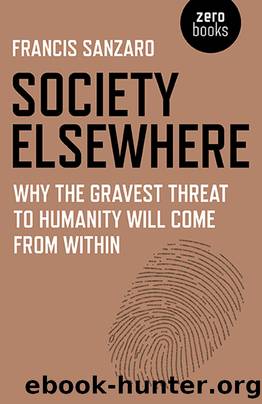Society Elsewhere by Francis Sanzaro

Author:Francis Sanzaro [Sanzaro, Francis]
Language: eng
Format: epub
ISBN: 978-1-78535-471-7
Publisher: John Hunt (NBN)
Published: 2018-06-28T16:00:00+00:00
Chapter 7
Poets for Hire
FBI agents who study serial killers create psychological profiles based on the nature of the crime, with the assumption that if you just connect the dots, a persona emerges, and once the persona emerges and you know what is motivating a killer, their behaviors and patterns become easier to predict.
At the heart of prediction is motivation—to predict is to know what motivates. Historically, human minds have performed these duties—priests, mothers, political advisors, seers, poets and election consultants have proven adept at delving deep into the human psyche and returning, often scathed, with a few pearls of wisdom. But is their time limited? Just as with Brad Pitt’s character in Moneyball, is it not time we step aside and let computers do the work for us?
According to editor-in-chief of Wired, Chris Anderson, this is exactly what we should do. “Forget taxonomy, ontology, and psychology,” says Anderson, “who knows why people do what they do? The point is they do it, and we can track and measure it with unprecedented fidelity. With enough data, the numbers speak for themselves.”1 Already, humanists are finding themselves within the world of software engineers since, as the myth goes, programmers suck at being human or, more kindly, they have often failed to cultivate, in their emotional lives, that bit of je ne sais quoi that renders us unmachinic.
This is why Silicon Valley is in need of poets. A Washington Post article sums it up nicely with “The Next Hot Job in Silicon Valley is for Poets.”2 Wait … what? Yes, poets and humanists are responsible for adding all those “umms” and “ahhs” and pauses to AI speech—Siri, Amazon, etc.—which, while completely unnecessary, renders them more quirky and relatable, with the desired end result being emotional connection and hence, brand loyalty.3 The funny thing, it’s working. The fact a select few poets can actually make money, however, is not an isolated case.
Algorithms need constant refinement, and one does not implement one and walk away. To the contrary, and despite their apparent effortlessness, their maintenance requires buckets of human labor, intellectual expertise and that human polish. Left to themselves, they can be quite stupid. For instance, when in a speech on the economy presidential hopeful Mitt Romney mentioned Big Bird, the phrase went viral, like Charlie Sheen’s “winning,” and when the phrase hit the Internet all of the algorithms treated it as a reference to Sesame Street and not politics. In this case, which is all too common, humans stepped in.4
A distinction needs to be made between a suggestion and a prediction. A prediction can be tested by its accuracy and lends itself to concrete phenomenon like voting patterns, physical movements and consumer choice, but a suggestion, as in a film recommendation or Pandora’s playlist, has no surefire way to test its accuracy. A suggestion seems innocuous, but even it requires a predicative power to be a functioning product; if Pandora always played stuff that felt awkward and out of place, we would not use it.
Download
This site does not store any files on its server. We only index and link to content provided by other sites. Please contact the content providers to delete copyright contents if any and email us, we'll remove relevant links or contents immediately.
Whiskies Galore by Ian Buxton(40329)
Introduction to Aircraft Design (Cambridge Aerospace Series) by John P. Fielding(32338)
Small Unmanned Fixed-wing Aircraft Design by Andrew J. Keane Andras Sobester James P. Scanlan & András Sóbester & James P. Scanlan(32141)
Craft Beer for the Homebrewer by Michael Agnew(17445)
Turbulence by E. J. Noyes(7037)
The Complete Stick Figure Physics Tutorials by Allen Sarah(6638)
Kaplan MCAT General Chemistry Review by Kaplan(6053)
The Thirst by Nesbo Jo(5785)
Bad Blood by John Carreyrou(5768)
Learning SQL by Alan Beaulieu(5410)
Weapons of Math Destruction by Cathy O'Neil(5036)
Man-made Catastrophes and Risk Information Concealment by Dmitry Chernov & Didier Sornette(4735)
iGen by Jean M. Twenge(4702)
Digital Minimalism by Cal Newport;(4540)
Life 3.0: Being Human in the Age of Artificial Intelligence by Tegmark Max(4507)
Audition by Ryu Murakami(4098)
1,001 ASVAB Practice Questions For Dummies by Powers Rod(4038)
Electronic Devices & Circuits by Jacob Millman & Christos C. Halkias(4027)
Pale Blue Dot by Carl Sagan(4001)
